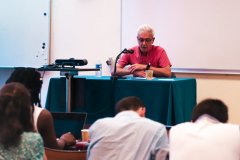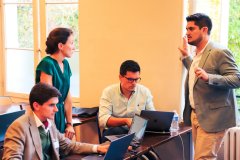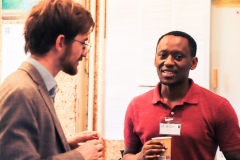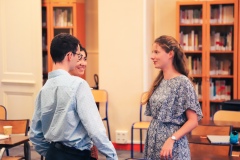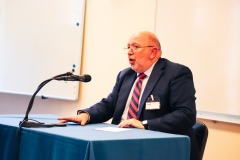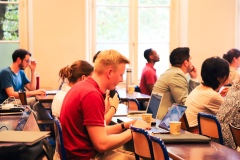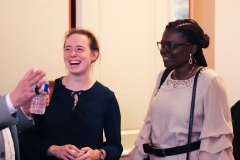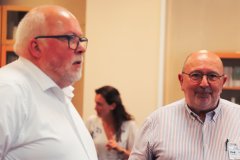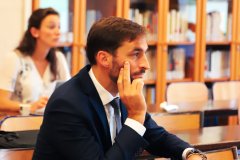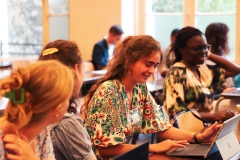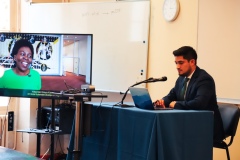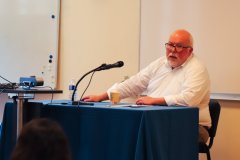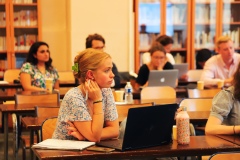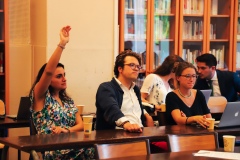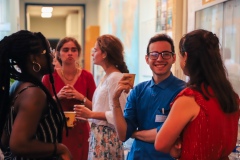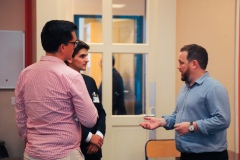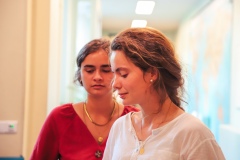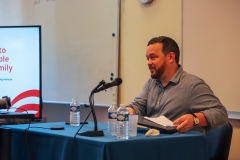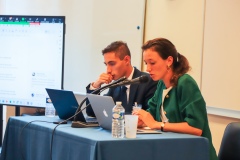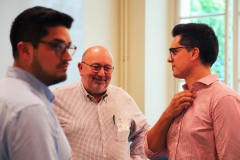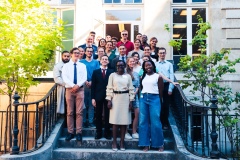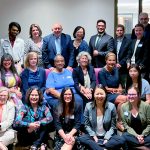
Advocating for innovative family policies
“We are truly excited about the quality and composition of the participant group and the enthusiastic engagement. We’ve crafted highly inspiring Advocacy Plans that will be presented in the EU and the UN. As a consequence, our dynamic network has been strengthened and expanded.”

VENUE & DATES
IPC – Facultés Libres de Philosophie et de Psychologie
(70, av. Denfert-Rochereau – 75014 Paris)
Monday 4th, Tuesday 5th and Wednesday 6th of September, 3.00 pm to 6.00 pm Paris time

The group of in-person participants.
FIRST DAY

During the lecture by Raymond Debord.
SECOND DAY

During the lecture by Bernard Guery.

During the presentation by Willem Adema.
THIRD DAY

During the presentation by Dominic Richardson.

After a meeting in preparation for the Workshop, with representatives of IPC, IFFD, United Nations Department of Economic and Social Affairs, Familles Durables, and the team of students who have worked on the background documentation (5th June 2023).
ADVOCACY PLANS
VIDEOS
PRESENTATIONS
 Leng Leng Thang Leng Leng Thang |
 Willem Adema Willem Adema |
 Dominic Richardson Dominic Richardson |
 Diane Ngankam Diane Ngankam |
 Jose Ricardo Araujo Jose Ricardo Araujo |
 Perrine Bruvier Perrine Bruvier |
 Raymond Debord Raymond Debord |
TEXTS
GALLERY
COUNTRIES WHERE PARTICIPANTS CAME FROM

VISION
To be an inspiration in advocating for a family perspective on policy making as the most meaningful vehicle for the wellbeing of upcoming generations. This approach is informed by both scientific evidence and social progress.
GOALS
- Critically assess the field of international human rights and development, its institutions, strategies and key actors.
- Explore how policy strategies are set, by creating a space where young advocates can discover an innovative style to promote social cohesion.
- Analyze the various challenges that family-responsive stakeholders face together, including governments, international institutions and the private sector.
PARTICIPATION
- Oriented to entry-level professionals or students of social sciences or a related field who have a strong interest in family policies and want to gain experience in the work of international organizations.
- A Certificate is provided to each participant upon attendance of at least 85% of the sessions.
- Active participation is highly recommended.
- It is organized in a hybrid mode.
HISTORY
Around 400 students and young professionals from 39 countries and diverse geographical, cultural and academic backgrounds have attended the first 10 editions of the IFFD Annual Advocacy Workshop. It is part of the IFFD Advocacy Training Project.
COST
The Workshop has no cost for participants.

METHOD
The Workshop is conducted entirely in English language. It consists of a three-day training program. Each day is devoted to a topic considered of special interest.
The programme is divided into four sections every day:
- Lecture by an academic expert to frame the state of the art.
- Presentation by a policy analyst to share evidence on family policy design, implementation and evaluation.
- Briefing by a young practitioner to showcase their professional experience.
- Negotiation among participants on an advocacy plan.
GUIDELINES FOR THE ADVOCACY PLAN
The Advocacy Plan elaborated every day will be presented at the United Nations and European Union as part of IFFD’s advocacy.
In order to create it, the following questions should be considered and answered:
- Establish measurable objectives.
- Define key messages.
- Determine the communication activities to deliver key messages.
- Decide what resources are necessary to complete each activity.
- Establish a timeline and responsible party for each activity.
- Fix how to evaluate whether you have reached your objectives.

CONTEXT
At the World Summit for Social Development (Copenhagen, March 1995), world leaders acknowledged the urgent need to address profound social problems which affect every country, especially poverty, unemployment, and social exclusion, and established a new consensus to promote people-centered development.
At the Sustainable Development Summit (New York, September 2015), Member States adopted the 2030 Agenda for Sustainable Development. With seven years left to achieve the Sustainable Development Goals, the COVID-19 pandemic has slowed the progress, including the full and productive employment and decent work for all and the reduction of inequalities within and among countries.
The United Nations General Assembly has also paid attention to the preparations for and observance of the 30th anniversary of the International Year of the Family (2024), stating that it can “contribute to ending poverty, ending hunger, ensuring a healthy life and promoting well-being for all at all ages, promoting lifelong learning opportunities for all, ensuring better educational outcomes for children, including early childhood development and education, enabling access to employment opportunities and decent work for parents and caregivers, achieving gender equality and the empowerment of all women and girls and eliminating all forms of violence.”
PROGRAMME
DAY 1: Education to break the intergenerational cycle of poverty
Since the founding of the United Nations, education has been recognized as one of the essential underpinnings of human development and societal progress. The Programme of Action of the International Conference on Population and Development (1994) includes calls to:
- Achieve universal access to primary education and eliminate the gender gap in primary and secondary education.
- Expand youth and adult education and lifelong learning programmes, with particular attention to migrants, indigenous people and disabilities.
- Provide formal and informal education on population and health issues.
- Ensure access to and use of modern communication technology.
- Address the barriers to education, especially in the least developed countries, with assistance from the international community.

Opening Remarks
Bahira Trask * (USA)
Lecture
Raymond Debord (France)
Presentation
Leng Leng Thang * (Signapore)
Briefing & Advocacy Plan
Diane Ngankam (Cameroon)
[Presented by Marie Reynard Jolie — IPC]
DAY 2: Full and productive employment and decent job to achieve work and family integration

Opening Remarks
Renata Kaczmarska * (UN)
Lecture
Bernard Guery (IPC)
Presentation
Willem Adema (OECD)
Briefing & Advocacy Plan
Jose Ricardo Araujo (Brazil)
[Presented by Mayalène Huber — IPC]
Decent and productive work is key to ensure that a life of dignity and to improve well-being. The UNICEF / International Labor Organization Working Paper on Supporting Workers with Family Responsibilities (2013) clearly states that:
- Paid paternity leave should be used as a strategy for encouraging men to share in the care of their newborns.
- Parental leave, including for men, would facilitate greater involvement of fathers in the care of their children, thereby contributing to positive child development outcomes, especially related to health and education.
- Fathers’ access to paid paternity and parental leave should be adequately facilitated by suitable policy and legislative frameworks.
- Employers’ organizations and trade unions should seek to incorporate these clauses into collective agreements.
DAY 3: Social protection to overcome vulnerable situations in the family
Income security is absolutely critical for providing caregivers, children and families the resources that they need to protect and promote their well-being. Social protection policies are also essential in complementing income from work and to guarantee at least a basic level of income security. According to the Social Protection Floors Recommendation (2012) by the International Labour Organization, social protection should always include:
- Access to essential health care, including maternity care.
- Basic income security for children, providing access to nutrition, education, care and any other necessary goods and services.
- Basic income security for people of active age with insufficient income, particularly in cases of sickness, unemployment, maternity and disability.
- Basic income security for older people.

Opening Remarks
Emmanuel Brochier (IPC)
Lecture
Joseph Grzywacz * (USA)
Presentation
Dominic Richardson (Netherland)
Briefing & Advocacy Plan
Perrine Bruvier (France)
[Presented by Salomon Brochier — IPC]





